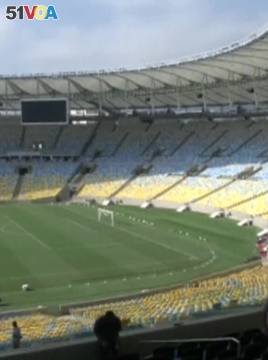June 09,2014
RIO DE JANEIRO — With days to go until the start of football’s (soccer’s) World Cup tournament, excitement is building in host country Brazil. This, despite a transit strike in Sao Paulo, the site of the opening match, and social discontent in parts of the country.
Copacabana beach, on the last Sunday before the World Cup. Families, beachgoers and fitness lovers are strolling Copacabana’s famous seaside promenade.

Work is finishing up on the fan park where thousands will gather during the matches. An estimated 800,000 foreign visitors will join millions of Brazilians to watch 64 matches in 12 cities around the country.
The excitement is building, says seamstress Teresa Christina, although it was slow to start because there is a lot of popular discontent.
“There is, but it’s relative. There’s a lot of disbelief because there’s a lot of violent crime," she said. "They say there’s no money for certain social needs yet there’s money for the Cup. Of course there should be a World Cup but there should be money for other things. But people need some fun, too.”
The run-up to one of the world’s greatest sporting events has been marred by social protests over corruption and a lack of social services. A transit strike in Sao Paulo, which is hosting Thursday’s opening match, has disrupted traffic for days.
The government has budgeted $11 billion for stadium and infrastructure construction. But people complain about poor public services, low pay and the high cost of living.
Rio resident Alexandre Oliveira says these problems run very deep.
“I think in these 30 days, the Cup is not really going to help," he said. "It’s more people’s mentality that will determine what happens afterwards. Maybe with the [national] elections at the end of the year [October], things will change. But these 30 days are just a seed being planted.”
Foreign visitors seem aware of the situation. Newlyweds Anne-Kathrin Hattels and her husband, Lasse, have come from Denmark for their honeymoon. They say they understand the anger over the high cost of the Cup.
“I kind of agree with that but it [the Cup] also brings a lot of tourists to the country, so they will get money from it. I know they spend a lot, but they also get a lot,” Anne-Kathrin said.
The protesters say they want to use the World Cup to press for change. Others say they prefer to showcase the good side of the country, its culture and its people. Many say they just want to have fun.